

Past life regression. Past life regression is a technique that uses hypnosis to recover what practitioners believe are memories of past lives or incarnations, though others regard them as fantasies or delusions or a type of confabulation.
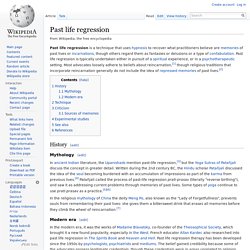
Past life regression is typically undertaken either in pursuit of a spiritual experience, or in a psychotherapeutic setting. Most advocates loosely adhere to beliefs about reincarnation,[1] though religious traditions that incorporate reincarnation generally do not include the idea of repressed memories of past lives.[2] History[edit] Mythology[edit] In ancient Indian literature, the Upanishads mention past-life regression,[3] but the Yoga Sutras of Patañjali discuss the concept in greater detail. In the religious mythology of China the deity Meng Po, also known as the "Lady of Forgetfullness", prevents souls from remembering their past lives: she gives them a bittersweet drink that erases all memories before they climb the wheel of reincarnation.[7] Modern era[edit]
Age regression in therapy. Age regression in therapy is the increased access to childhood memories, thoughts and feelings as a part of the psychotherapeutic process.[1] Age regression is an aspect of a number of psychotherapies: i.e., in hypnotherapy the term describes a process in which the patient returns to an earlier stage of life in order to explore a memory or to get in touch with some difficult-to-access aspect of their personality.
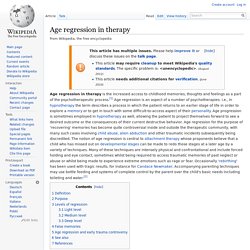
Age progression is sometimes employed in hypnotherapy as well, allowing the patient to project themselves forward to see a desired outcome or the consequences of their current destructive behavior. Age regression for the purpose of 'recovering' memories has become quite controversial inside and outside the therapeutic community, with many such cases involving child abuse, alien abduction and other traumatic incidents subsequently being discredited.
Repressed memory. Repressed memories are hypothesized memories having been unconsciously blocked, due to the memory being associated with a high level of stress or trauma.
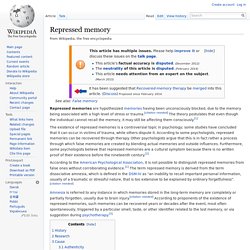
[citation needed] The theory postulates that even though the individual cannot recall the memory, it may still be affecting them consciously.[1] The existence of repressed memories is a controversial topic in psychology; some studies have concluded that it can occur in victims of trauma, while others dispute it. According to some psychologists, repressed memories can be recovered through therapy. The Forgotten Childhood: Why Early Memories Fade. Eight-year-old Francis Csedrik pauses mid-swing in his backyard in Washington, D.C.

Like most kids, he's gradually losing his memories of things that happened when he was 3 years old. Meg Vogel/NPR hide caption itoggle caption Meg Vogel/NPR Eight-year-old Francis Csedrik pauses mid-swing in his backyard in Washington, D.C. Like most kids, he's gradually losing his memories of things that happened when he was 3 years old. Meg Vogel/NPR Francis Csedrik, who is 8 and lives in Washington, D.C., remembers a lot of events from when he was 4 or just a bit younger. But Francis looks puzzled when his mom, Joanne Csedrik, asks him about a family trip to the Philippines when he was 3. The Enneagram of Character Fixation - The Leela Foundation - Eli Jaxon-Bear. Stanford University, August 1994Keynote speech by Eli Jaxon-Bear "When you can recognize who you are not, then there is a possibility to wake up and discover who you really are!

" I have never met anyone who doesn't want to be happy. The desire for happiness is the bottom line for the human species and maybe for all species. Everyone wants to be happy. The question is: how is it possible that this desire for happiness is threatening to destroy our species and Mother Earth. I have come here to share with you the great good news that the end of suffering is waking up from the trance induction of who you think you are.
So, just close your eyes for a moment and completely relax. Vice. The opposite of vice is virtue.[2] Etymology[edit] The modern English term that best captures its original meaning is the word vicious, which means "full of vice".
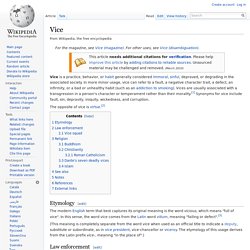
In this sense, the word vice comes from the Latin word vitium, meaning "failing or defect".[3] (This meaning is completely separate from the word vice when used as an official title to indicate a deputy, substitute or subordinate, as in vice president, vice-chancellor or viceroy. Thought suppression. When an individual tries to suppress thoughts under a high cognitive load, the frequency of those thoughts increases and becomes more accessible than before.[3][4] Evidence shows that people can prevent their thoughts from being translated into behavior when self-monitoring is high; this does not apply to automatic behaviors, though (e.g., the skinhead scenario), and may result in latent, unconscious actions.[5] This phenomenon is made paradoxically worse by increasing the amount of distractions a person has, although the experiments in this area can be criticized for using impersonal concurrent tasks, which may or may not properly reflect natural processes or individual differences.
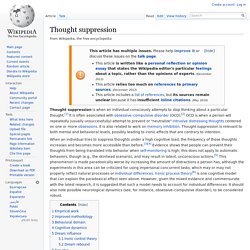
Ironic process theory[6] is one cognitive model that can explain the paradoxical effect seen above. However, given the mixed evidence and commensurate with the latest research, it is suggested that such a model needs to account for individual differences.